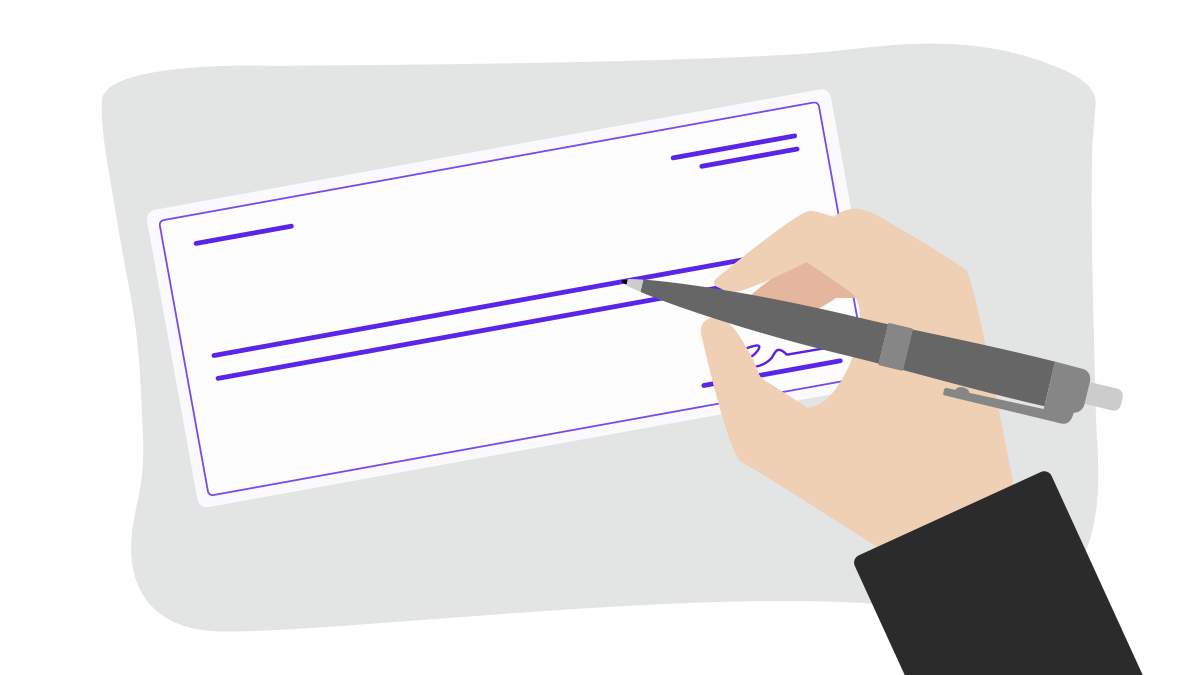Why We Still Write Checks

Millions of American consumers have become accustomed to paying their way through the day with credit. Mobile payment apps and credit cards are often the go-to payment method of choice, while cash—which used to be the only form of payment accepted everywhere—has started to feel outdated and inconvenient. Some people carry no cash at all.
Check-writing is still a useful practice for those times when cash or credit cards just don’t make sense.
Think you may not need a checkbook anymore? Consider these services and occasions where checks may be preferable.
- Small Businesses, Contractors, Freelancers
Credit card companies charge vendors fees for credit-card acceptance, so many of smaller businesses don’t accept them. House cleaners, repairmen, landscapers, exterminators, maintenance workers, handymen, and other local workers you may bring into your home or business to perform small service jobs often don’t take credit cards. A check is the most convenient and trustworthy way to pay them, and your check also acts as your receipt.
- Housing
Landlords and mortgage lenders rarely take plastic, and when they do, they often pass the fees onto the tenant. Checks still remain the most popular way to pay for your housing.
- Gifts
Financial gifts to friends and family members are still most commonly given by check. While small gifts can be given in cash, people tend to feel more comfortable giving larger monetary gifts—for weddings, birthdays, graduations, and holidays—in the form of a check, which can be canceled and replaced if it is lost.
- Personal Loans and Reimbursements
Money you lend to your friends—and money you owe them—is most safely repaid with checks. If a personal loan is for a large amount of money, checks can serve as verification of the amount paid, by whom, to whom, and on what date, eliminating the possibility of a dispute later. The memo line allows the lender to specify what the money is for and that it is, indeed, a loan.
- Taxes
In addition to income taxes that you file and pay to state and federal governments, you typically pay smaller, local taxes and fees throughout year. Your property and your vehicles are common examples, and also local fees that are collected throughout the year by your county treasurer. Local governments are not always equipped to accept credit cards, and when they are, they almost always come with convenience fees for the payor. Checks, on the other hand, are a preferred method of payment and cost the payor nothing, except the stamp.
- Homeowner's Association
Home-buying is on the rise, and this year in particular has seen an exodus of workers from metro areas relocate to suburban areas for more space. Many suburban homes are located in neighborhoods with a property owner’s association who enforces basic rules to maintain home values. The HOA that cashes your check each month is comprised of residents. The goal is to keep costs and fees to a minimum so that residents don’t have to make up for shortages. Checks are still the most convenient way for people to pay their dues.
- Donations
Large charities accept credit card donations, but smaller, independent, and local ones sometimes cannot, and they prefer checks so that the full value of the donation can be directed to the organization. Money spent on financial fees is money that cannot be spent on the charity’s provisions—often food, clothing, or essential services for the needy. Checks remain the best way to donate to charity, and they act as your receipt, come tax time.
- Doctors
When you pay medical fees in the office at the time of service, you may typically use credit. But if you have your doctor bill you, credit card is not always an option, or you may have to call the office and give your credit information over the phone, which has less security and convenience. Checks offer a secure and convenient way to cover medical bills.
- Your Kid's Activities
Just as your local county or town treasurer may not offer credit card acceptance, chances are your local recreation center, school, camp, or kids’ sports program doesn’t either. These programs are often sponsored by the town or the local school and often run by parents, volunteers, and a small staff. They are simple operations that try to keep costs to families at a minimum. Some have begun to use third-party services that accept credit cards on their behalf, but that requires signing up online, and the fees are typically passed on to the customer.
- When Security is Important
Checks are more secure than cash, and a copy of the cashed check acts as receipt. Checks are safer to mail than cash, and checks can be canceled if they fail to reach their destination. Checkeeper offers an easy-to-use template for printing your own checks on demand and keeping track of each check created. Your financial information is stored securely and you can create and customize as many checks as you need.